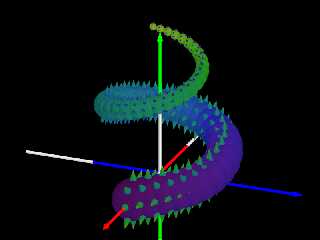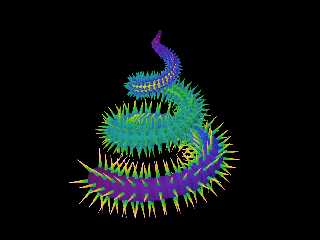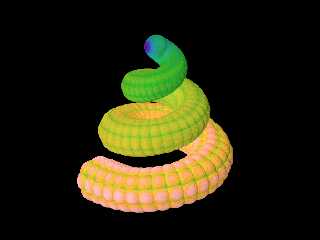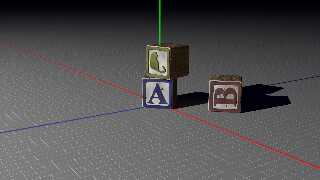 |
 |
|
 |
|
 |
|  |
|  |
|
 |
|
 |
|  |
|  |
|
 |
On 28/02/2023 09:58, ingo wrote:
> I.i.r.c. Poseray https://sites.google.com/site/poseray/ can do mesh displacement
> based on uv vectors and images. Never tried it myself.
Mmm, Poseray ...
I have one, but it's almost the same as importing mesh from ZBrush.
Your first advice about using 'meshmaker' seems more attractive to me...
--
YB
Post a reply to this message
|
 |
|  |
|  |
|
 |
|
 |
|  |
|  |
|
 |
yesbird <sya### [at] gmail com> wrote:
> On 28/02/2023 09:58, ingo wrote:
> Mmm, Poseray ...
> I have one, but it's almost the same as importing mesh from ZBrush.
> Your first advice about using 'meshmaker' seems more attractive to me...
A long time ago I wrote an unfinished tool to convert mesh2 to obj files.
Something like that could be made to write a bunch of pov-ray arrays to a file.
Then you have full control over the mesh and can transform it by using uv
information and functions.
Or, ask FlyerX to add such an option to Poseray, if they are still working on
it.
https://news.povray.org/povray.binaries.utilities/thread/%3CXns94F5A773245Aseed7%40news.povray.org%3E
ingo com> wrote:
> On 28/02/2023 09:58, ingo wrote:
> Mmm, Poseray ...
> I have one, but it's almost the same as importing mesh from ZBrush.
> Your first advice about using 'meshmaker' seems more attractive to me...
A long time ago I wrote an unfinished tool to convert mesh2 to obj files.
Something like that could be made to write a bunch of pov-ray arrays to a file.
Then you have full control over the mesh and can transform it by using uv
information and functions.
Or, ask FlyerX to add such an option to Poseray, if they are still working on
it.
https://news.povray.org/povray.binaries.utilities/thread/%3CXns94F5A773245Aseed7%40news.povray.org%3E
ingo
Post a reply to this message
|
 |
|  |
|  |
|
 |
|
 |
|  |
|  |
|
 |
On 28/02/2023 11:29, ingo wrote:
> A long time ago I wrote an unfinished tool to convert mesh2 to obj files.
> Something like that could be made to write a bunch of pov-ray arrays to a file.
> Then you have full control over the mesh and can transform it by using uv
> information and functions.
> Or, ask FlyerX to add such an option to Poseray, if they are still working on
> it.
Thanks for another idea, but I would like to stay 'inside' POV as long
as possible, avoiding external tools. Now, after a few experiments, I
see, that adding some arbitrary 'extensions' to geometry (as in the
attached image, for ex.) is not too complicated.
Maybe I will try to shift the mesh's vertices according to some noise
function too.
--
YB
Post a reply to this message
Attachments:
Download 'play_spline.png' (151 KB)
Preview of image 'play_spline.png'

|
 |
|  |
|  |
|
 |
|
 |
|  |
|  |
|
 |
Op 28-2-2023 om 07:58 schreef ingo:
> yesbird <sya### [at] gmail com> wrote:
>> thanks for ideas and examples. Although fist method works fine, second
>> looks more attractive, as, I suppose, will allow 'decorate' imported
>> mesh, which gives me more control on the object's shape.
>
> I.i.r.c. Poseray https://sites.google.com/site/poseray/ can do mesh displacement
> based on uv vectors and images. Never tried it myself.
>
> ingo
>
>
See attachment.
--
Thomas com> wrote:
>> thanks for ideas and examples. Although fist method works fine, second
>> looks more attractive, as, I suppose, will allow 'decorate' imported
>> mesh, which gives me more control on the object's shape.
>
> I.i.r.c. Poseray https://sites.google.com/site/poseray/ can do mesh displacement
> based on uv vectors and images. Never tried it myself.
>
> ingo
>
>
See attachment.
--
Thomas
Post a reply to this message
Attachments:
Download 'displacement mapping - howto.pdf' (527 KB)
|
 |
|  |
|  |
|
 |
|
 |
|  |
|  |
|
 |
Thomas de Groot <tho### [at] degroot org> wrote:
> See attachment.
Thanks :) org> wrote:
> See attachment.
Thanks :)
Post a reply to this message
|
 |
|  |
|  |
|
 |
|
 |
|  |
|  |
|
 |
On 27/02/2023 21:32, yesbird wrote:
> Hi,
> while working on Yes-project, I am trying to find the way of making
> the objects less 'geometrical', giving them more natural and 'noisy'
> shapes (like in this attachment, for example). The only way I found in
> manual is to play with normals, but I'd like to have an influence on
> geometry, to apply more relief.
Thanks to all your comments, advice and links, a solution was finally
found. Script is working by making a path of spheres along a spline and
applying relief elements to each sphere. It's left only to make some
randomization and push code to the parameterized macro.
Thanks a lot to everyone !
--
YB
Post a reply to this message
Attachments:
Download 'play_spline_pins.png' (290 KB)
Download 'play_spline_spheres.png' (304 KB)
Preview of image 'play_spline_pins.png'

Preview of image 'play_spline_spheres.png'

|
 |
|  |
|  |
|
 |
|
 |
|  |
|  |
|
 |
yesbird <sya### [at] gmail com> wrote:
> Hi,
> while working on Yes-project, I am trying to find the way of making
> the objects less 'geometrical', giving them more natural and 'noisy'
> shapes (like in this attachment, for example). The only way I found in
> manual is to play with normals, but I'd like to have an influence on
> geometry, to apply more relief.
>
> It's possible to pass a noisy hi-res mesh from ZBrush, as I'm doing now,
> but this is not 'pure' POV-way and import takes some 'non-zero' time.
>
> Maybe anyone can advise something about such arbitrary geometry
> modifications ?
> Thanks in advance.
> --
> YB
My preferred method for doing this, albeit introducing some longer render times,
is to use isosurface objects. I usually start with a function that defines the
non-perturbed shape of the object, e.g.:
#local _shape_fn = function(x,y,z) {
sqrt(x*x+y*y+z*z) - 1
}
for a 1-unit radius sphere.
I then use one of several techniques to do the perturbations. For example,
#local _shape_fn = function(x,y,z) {
sqrt(x*x+y*y+z*z) - (1+0.1*f_snoise3d(x,y,z))
}
or
#local _pattern_fn = function {
pigment {
bozo
color_map {
[0.0 rgb 0]
[1.0 rgb 1]
}
}
}
#local _shape_fn = function(x,y,z) {
sqrt(x*x+y*y+z*z) - (1 + 0.1*_pattern_fn(x,y,z).gray)
}
or, if your shape function is well-behaved, (i.e. returns a value representing
the distance from a point to the surface of your object), you could do it this
way instead:
#local _shape2_fn = function(x,y,z) {
_shape_fn(x,y,z) - 0.1*_pattern_fn(x,y,z).gray
}
The attached image is a pretty complex example, where the basic shape of the
wood-part of the blocks is basically f_rounded_box, but patterns are applied for
the wood grain, dents in the wood, cracks in the wood, etc.
-- Chris R. com> wrote:
> Hi,
> while working on Yes-project, I am trying to find the way of making
> the objects less 'geometrical', giving them more natural and 'noisy'
> shapes (like in this attachment, for example). The only way I found in
> manual is to play with normals, but I'd like to have an influence on
> geometry, to apply more relief.
>
> It's possible to pass a noisy hi-res mesh from ZBrush, as I'm doing now,
> but this is not 'pure' POV-way and import takes some 'non-zero' time.
>
> Maybe anyone can advise something about such arbitrary geometry
> modifications ?
> Thanks in advance.
> --
> YB
My preferred method for doing this, albeit introducing some longer render times,
is to use isosurface objects. I usually start with a function that defines the
non-perturbed shape of the object, e.g.:
#local _shape_fn = function(x,y,z) {
sqrt(x*x+y*y+z*z) - 1
}
for a 1-unit radius sphere.
I then use one of several techniques to do the perturbations. For example,
#local _shape_fn = function(x,y,z) {
sqrt(x*x+y*y+z*z) - (1+0.1*f_snoise3d(x,y,z))
}
or
#local _pattern_fn = function {
pigment {
bozo
color_map {
[0.0 rgb 0]
[1.0 rgb 1]
}
}
}
#local _shape_fn = function(x,y,z) {
sqrt(x*x+y*y+z*z) - (1 + 0.1*_pattern_fn(x,y,z).gray)
}
or, if your shape function is well-behaved, (i.e. returns a value representing
the distance from a point to the surface of your object), you could do it this
way instead:
#local _shape2_fn = function(x,y,z) {
_shape_fn(x,y,z) - 0.1*_pattern_fn(x,y,z).gray
}
The attached image is a pretty complex example, where the basic shape of the
wood-part of the blocks is basically f_rounded_box, but patterns are applied for
the wood grain, dents in the wood, cracks in the wood, etc.
-- Chris R.
Post a reply to this message
Attachments:
Download 'blocks-2023-05-04-1.png' (1276 KB)
Preview of image 'blocks-2023-05-04-1.png'

|
 |
|  |
|  |
|
 |
|
 |
|  |
|
 |




![]()